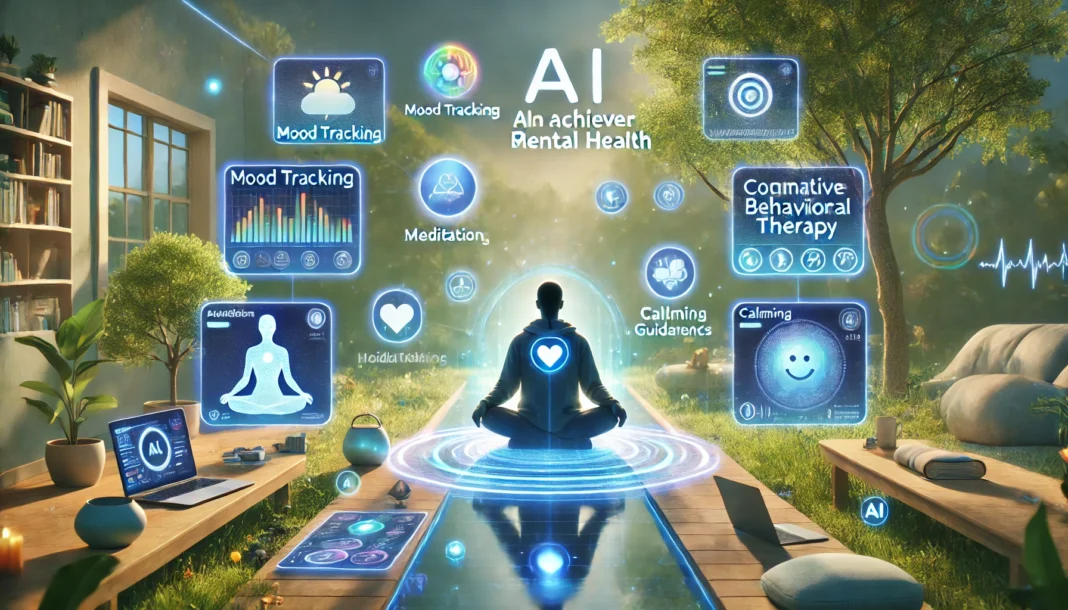Mental health has become a crucial part of our lives. As technology evolves, AI (artificial intelligence) offers unique ways to support our mental well-being. From virtual therapy to personalized mindfulness exercises, AI is changing the game. In this article, we’ll explore how AI can help you improve your mental health and live a more balanced life.
The Rise of AI in Mental Health
AI has rapidly evolved, and its impact on mental health is increasingly noticeable. With the right tools, you can use AI to enhance your emotional well-being. The best part? These tools are accessible, easy to use, and often available 24/7. In fact, AI is now a key player in mental health care.
AI can assist in various ways. It can provide virtual therapy, analyze your mood patterns, and even suggest personalized coping strategies. In short, AI helps bridge gaps in traditional mental health care and makes support accessible to everyone.
Virtual Therapy: Anytime, Anywhere
One of the most practical applications of AI in mental health is virtual therapy. AI-powered therapy apps, like Woebot and Wysa, provide instant access to support. These apps use AI chatbots to engage users in conversations, offering emotional support and practical tools.
AI-powered therapy isn’t meant to replace human therapists. Instead, it supplements traditional therapy by providing a supportive resource between sessions. AI chatbots guide users through techniques such as Cognitive Behavioral Therapy (CBT), helping people manage stress, anxiety, and depression.
These platforms offer privacy and convenience. You don’t need to schedule appointments or worry about waiting weeks to talk to a professional. AI provides immediate assistance when you need it most.
Benefits of Virtual Therapy
- Access to Support 24/7: AI-powered platforms are available whenever you need them. Whether it’s early in the morning or late at night, you can access help instantly.
- Comfort and Privacy: Many people feel more comfortable talking to a bot than a person. It removes the judgment factor and allows for more open conversations.
- Immediate Help: You don’t have to wait for an appointment. AI tools give you immediate feedback and strategies to manage your mental health.
AI for Personalized Mental Health Insights
AI isn’t just about therapy—it also provides personalized mental health insights. Apps like Headspace and Calm use AI to tailor mindfulness exercises to your needs. The more you use these apps, the better they understand your mental health patterns.
For example, if you often experience stress in the morning, AI can suggest short meditation sessions or breathing exercises to help you start your day on a calm note. By analyzing your usage and feedback, AI can fine-tune your experience, offering specific recommendations that suit your emotional needs.
AI doesn’t just track your mood; it actively helps you adjust your habits. Over time, these tools can provide insights on how to improve your mental health in meaningful ways. As a result, they can lead to more effective stress management, better sleep, and even improved relationships.
How AI Helps with Mental Health Patterns
- Mood Tracking: AI can track your mood and offer suggestions based on data analysis.
- Personalized Recommendations: Apps adjust the experience based on your unique habits and feedback.
- Holistic Approach: AI looks at your overall mental well-being, offering a more comprehensive view of your mental health.
AI for Stress and Anxiety Management
Dealing with stress and anxiety can feel overwhelming, but AI tools make it easier to manage. Calm and Headspace offer guided meditations, deep breathing exercises, and relaxation techniques—all powered by AI. These tools can help you cope with stress and anxiety in real-time.
AI can detect subtle changes in your mood or stress level. Based on this data, the system might recommend specific relaxation exercises to reduce tension. For example, if you’re feeling anxious, the app might suggest a deep breathing exercise or a guided meditation to calm your mind.
Moreover, AI tools like Replika help reduce anxiety by engaging you in meaningful conversations. These AI chatbots can talk with you about anything on your mind, helping you work through your feelings and emotions.
How AI Eases Stress
- Real-Time Recommendations: AI gives immediate suggestions to help you manage stress or anxiety in the moment.
- Effective Breathing Exercises: Deep breathing techniques and visualizations help reduce physical symptoms of anxiety.
- Daily Check-Ins: Some apps offer daily mood check-ins, helping you track patterns and adjust your routine.
AI in Sleep and Well-Being
Sleep is a major component of mental health. When you don’t sleep well, it impacts your mood, concentration, and overall well-being. AI can help improve your sleep by analyzing your sleep patterns and offering personalized tips. Apps like Sleep Cycle use AI to monitor your sleep stages and suggest improvements.
AI can also suggest changes to your environment. For instance, it may recommend reducing screen time before bed or adjusting your room temperature to promote better sleep quality. Additionally, sleep-focused apps can guide you through relaxation exercises designed to calm your mind before bedtime.
AI’s Role in Improving Sleep
- Track Sleep Patterns: AI monitors your sleep and offers advice on how to improve rest quality.
- Personalized Sleep Tips: Recommendations adjust to your sleep habits, helping you fall asleep faster and stay asleep longer.
- Relaxation Techniques: AI suggests meditations or soothing sounds to help you unwind before bed.
A Quick Overview of AI and Mental Health: Key Facts
Here’s a table with some key figures and trends in AI-driven mental health care:
| Category | Fact/Statistic |
|---|---|
| AI in Therapy Apps | Over 60% of users report reduced anxiety levels after 4 weeks of AI therapy use. |
| Market Growth | The global AI in mental health market is projected to reach $4.3 billion by 2029. |
| Personalized Insights | 85% of users find personalized recommendations more effective than generic advice. |
| Stress Management | 72% of AI-powered stress management apps report improved user mood within 5 minutes of use. |
| Sleep Improvement | 50% of users report better sleep quality after using AI-powered sleep apps for 2 weeks. |
AI and Future Mental Health Support
As AI continues to evolve, it will provide even more opportunities for improving mental health. The future promises smarter, more intuitive tools that offer highly personalized experiences. Imagine AI that can predict when you’re about to have a stressful day and offer preemptive strategies to stay calm. The possibilities are endless.
AI could also assist therapists by providing insights into how a patient is progressing, allowing for better treatment adjustments. It might even detect early signs of mental health issues, offering proactive recommendations before a crisis happens.
In the future, AI will become an even more integrated part of mental health care, making therapy and support more accessible to people worldwide.
Conclusion: Embrace AI for Better Mental Health
AI isn’t just a buzzword—it’s a powerful tool that can help you improve your mental health. Whether you’re looking for virtual therapy, personalized insights, or stress management tools, AI has something to offer. The best part? You can access these tools from the comfort of your home and get the support you need at any time.
Start incorporating AI into your daily routine and see how it enhances your mental well-being. With so many AI tools available today, improving your mental health has never been easier or more accessible.
By leveraging AI’s potential, you can transform how you approach mental health. The right AI tools can help you build healthier habits, reduce stress, and improve your overall well-being. So why not give it a try? Your mental health deserves the best support available, and AI might just be the key to unlocking it.

